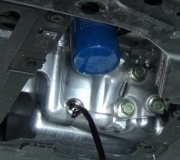It's not the oil; it's the additives. The same is true when switching from one brand of regular oil to a different brand. It's the seal conditioners, detergents, viscosity index improvers, and corrosion inhibitors that are at issue. Those are what wear out and is why oil is changed at regular intervals. Those additives might work perfectly fine in both brands of oil, but they may be incompatible with each other. For example, the seal conditioner in one oil might be broken down by the detergent in a different brand.
I had a former student switch to synthetic and within a few days the engine started to leak. After a month there was a six-inch-diameter puddle every place he parked. After a few months of putting up with the added expense of the oil that wasn't needed, he switched back to regular oil, and the leaks cleared up after a few more months.
The big selling point of synthetic oil is it remains more fluid at cold temperatures which supposedly promotes easier starting. There's no engine out there that is damaged by lack of oil flow on cold days, and thick oil gets warm real soon after starting the cold engine. The only time starting might become an issue is when cranking speed is too low due to a weak battery. That's where a more fluid oil might help get the engine started.
What is never discussed is besides "isolating moving parts from each other", which cold, thick oil does real well, it's other main job is to hold contaminants in suspension so they can be carried away to the filter. I suspect if synthetic oil was superior in that regard, they would advertise it.
You must remember too that the additives in oil are always being improved, and the requirements the manufacturers deem necessary for their engines are constantly being upgraded. When you look at the listings on the container, you'll see an "SF" or "SG" rating. When the manufacturers specify a more stringent set of characteristics, the oil manufacturers respond, then issue the next letter to denote that. If the latest oil has an "SF" rating, that is what you'll find in all the stores. That oil will work fine in older engines that call for any oil with a lower rating. The only time you have to worry is when you have a stash of older oil in your garage. If it has an older rating, the oil might break down at higher temperatures, or there's some characteristic of the additives that might not meet the engine's needs under all conditions.
The "S" in "SG" stands for spark ignition, meaning a gas engine. The container will also have a "CD" rating. "C" is for compression ignition, meaning a diesel engine. The second letter jumps one letter higher each time there is a significant improvement in the oil to meet an engine's needs. Once the set of additives is improved to meet the latest requirements, there is no reason to keep producing oil with the older additives, so you'll always find the latest and best product on the store shelves.
Be aware too the automotive marketing business is extremely competitive, and if a manufacturer could advertise one more horsepower, one more cubic foot of cargo space, or one more cup holder, you can be sure they would do it. If there was any advantage to be gained by using synthetic oil that they could advertise, they certainly would do that too. As it is now, engines are designed to perform properly with regular oil, so for the much higher cost, there has to be some real benefit that you have identified. To assume one oil is better simply because it's more expensive is not valid.
Thursday, February 18th, 2021 AT 1:17 PM
(Merged)




